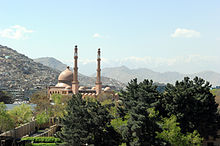
Back Literatura de Afganistán Spanish ادبیات افغان Persian Letteratura afghana Italian افغاني ادبیات Pashto/Pushto Afghansk litteratur Swedish Afg'on adabiyoti Uzbek
| Part of a series on the |
| Culture of Afghanistan |
|---|
 |
| History |
| People |
| Languages |
| Mythology |
| Cuisine |
| Festivals |
| Religion |
| Sport |
Afghan literature or literature of Afghanistan refers to the literature produced in the Islamic Emirate of Afghanistan.[1][2] Influenced by Central and South Asian literature, it is predominantly written in two native and official languages of Afghanistan, Dari and Pashto. Some regional languages such as Uzbek, Turkmen, Balochi, and Pashayi also appears in Afghan literature.[3] While Afghanistan is a multilingual country, these languages are generally used as oral compositions and written texts by the Afghan writers and in Afghan curriculum. Its literature is highly influenced by Persian and Arabic literature in addition to Central and South Asia.[1][2]
The history of the broader Afghan literature spans between ancient and modern Afghanistan. The earliest works of literature were orally transmitted. Its writing system is historically associated with Arabic script. The oldest extant records of the literature are believed derivative of the Nabataean variation of the Aramaic alphabet, dating to the 5th and 6th centuries. However, it primarily originated in the early Islamic centuries.
Archaeological researches conducted since 1922 has shown fine art of the pre-Islamic scripts. The country's literature was originally written and transmitted in Arabic alphabet, making it to possess a rich linguistic legacy of pre-Islamic scripts, which existed before being replaced by the Arabic alphabet, including Sharada, Kharosthi, Greek, and Brāhmī following by the Islamic conquest of Afghanistan. Bactrian language is also associated with pre-Islamic scripts.[4][5]
- ^ a b Pillalamarri, Akhilesh. "Afghanistan's Persian Linguistic Identity". thediplomat.com.
- ^ a b Widmark, Anders. "The View from Within: An Introduction to New Afghan Literature". Words Without Borders.
- ^ "What Languages Are Spoken In Afghanistan?". WorldAtlas. 25 April 2017.
- ^ "Afghanistan Literature". Afghanistan's Web Site. 9 May 1984. Retrieved 7 July 2020.
- ^ "Afghanistan – The arts and cultural institutions". Encyclopedia Britannica.
© MMXXIII Rich X Search. We shall prevail. All rights reserved. Rich X Search